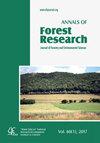土耳其半湿润地区的安纳托利亚黑松和无根栎林的蒸腾作用
IF 1.7
3区 农林科学
Q2 FORESTRY
引用次数: 2
摘要
蒸腾是流域水收支的一个关键组成部分。因此,确定具有不同特征的林分的蒸腾作用对流域水文学和各种环境下的森林管理实践具有重要意义。本研究的目的是比较安纳托利亚黑松(Pinus nigra Arn)的蒸腾作用。无性系种群。pallasiana(羊肉)。栎)和无根栎(栎)(Liebl.)林分,并根据测量的气候因子模拟蒸腾作用。林分蒸腾是通过树干热平衡法测量树液流量来计算的。通过探索性因子分析(PCR)检测影响林分蒸腾的气象因子,建立了预测松木和栎树林分蒸腾的线性回归方程。松林的日和年平均冠层蒸腾量(Ec)分别为1.05 mm day-1和378.3 mm year-1,栎林的日和年平均蒸腾量分别为3.52 mm day-1和801.7 mm year-1。日林分蒸腾与风速、总辐射、空气蒸汽压差和气温呈高度正相关,与相对湿度呈负相关。土壤水势对林分蒸腾的影响较小。模型方程对松林蒸腾变化的贡献率为81%,对栎林的贡献率为85%。因此,应将林分蒸腾作为有效的植被管理措施,作为估算该地区松木和栎树林分蒸腾的模型方程。本文章由计算机程序翻译,如有差异,请以英文原文为准。
Transpiration of Anatolian black pine and sessile oak forest stands in a sub-humid region of Turkey
Transpiration is a key component of the watershed water budget. Therefore, determining the transpiration of forest stands with different characteristics have been of interest for watershed hydrology and forest management practices in a wide range of environments. The objectives of this study were to compare transpiration of Anatolian black pine (Pinus nigra Arn. subsp. pallasiana (Lamb.) Holmboe) and sessile oak (Quercus petraea (Matt.) Liebl.) tree stands and to model transpiration based on the measured climatic factors. Stand transpirations were calculated from sap flow measurements made by the trunk heat balance method. We conducted an exploratory factor analysis (PCR) to detect affecting meteorological factors of stand transpiration, and we developed linear regression equations to predict transpiration of pine and oak stands. Mean daily and yearly canopy transpiration (Ec) were 1.05 mm day-1 and 378.3 mm year-1 for the pine stand and 3.52 mm day-1 and 801.7 mm year-1 for the oak stand. There was a highly positive correlation between daily stand transpiration and wind speed, global radiation, air vapour pressure deficit and air temperature, but a negative correlation with relative humidity for both stands. Soil water potential had little effect on stand transpiration. The model equations accounted for 81% of the variations in transpiration for the pine stand and 85% for the oak stand. Therefore, the transpiration of forest stands should be considered for effective vegetation management practices, as model equations to estimate the transpiration of pine and oak stands in the region.
求助全文
通过发布文献求助,成功后即可免费获取论文全文。
去求助
来源期刊

Annals of Forest Research
FORESTRY-
CiteScore
2.20
自引率
11.10%
发文量
11
审稿时长
12 weeks
期刊介绍:
Annals of Forest Research is a semestrial open access journal, which publishes research articles, research notes and critical review papers, exclusively in English, on topics dealing with forestry and environmental sciences. The journal promotes high scientific level articles, by following international editorial conventions and by applying a peer-review selection process.
 求助内容:
求助内容: 应助结果提醒方式:
应助结果提醒方式:


